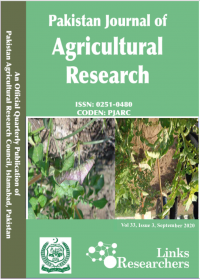ABSTRACT
Salicylic acid is classified as a compound that effectively reduces the sensitivity and environmental stress of crops as it alleviates the adverse effects of numerous stress causing factors. Numerous SA levels are found to protect several species of plants against environmental stresses by initiating different processes that are involved in the mechanism of stress tolerance. SA is part of an extremely complex signal transduction network’s part and it works differently in different systems. Drought stress is a major restraint for crop production in arid and semi arid states such as Pakistan. In this study experiments were conducted against the responses of strawberry plant to both pre-harvest application of salicylic acid and drought treatments. The design of the experiment was a factorial randomized complete block design (RCBD) with five water regimes (150ml, 175ml, 200ml, 225ml, 250ml) and five levels of SA at (0.0mML-1, 0.5mML-1 1mML-1, 2mML-1, and 3mML-1) as the main factors and four replications. The experiments were conducted in the research area of AAUR Pakistan. Statistical analysis showed drought stress significantly reduced vegetative and reproductive growth, along with various and biochemical attributes, but augmented the leaf proline. SA application significantly increased plant fresh and dry weight, leaf area, proline and decreased root length, number of roots and water use efficiency. SA treatment therefore decreased adverse effect of stress on strawberry plants. Thus the result suggests that SA at a concentration of 3mML-1 concentration could be used commercially to improve yield of strawberry.
To share on other social networks, click on any
share button. What are these?






